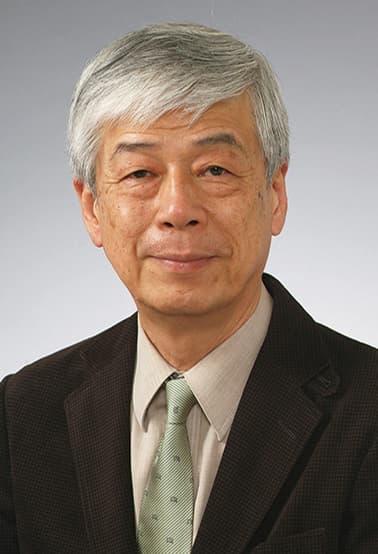
Profile
- Bachelor of Engineering from Kyoto University, Master of Engineering (major in Applied Mathematics and Physics) from Kyoto University, Doctor of Engineering from Kyoto University
- Professor Emeritus, Kyoto University
- Former Professor at Graduate School of Informatics, Kyoto University
- Former Professor at Nara Institute of Science and Technology
- Former Professor at Graduate School of Science and Engineering, Nanzan University
- Fellow, Operations Research Society of Japan
Responsible Subject
- Fundamental Mathematics for Applied Informatics
Field of Specialization
- Combinatorial Optimization
- Operations Research
Business Performance
Awards
- Paul Y. Tseng Memorial Lectureship in Continuous Optimization (Mathematical Optimization Society, 2015)
- Kondo Prize (Operations Research Society of Japan, 2015)
- 2011 Best Paper Prize (Computational Management Science, 2012)
- Achievement Award (Operations Research Society of Japan, 2010)
- Highly Cited Researcher (ISI Web of Knowledge, 2009)
- Best Paper Award 2009 (Japan Gas Association, 2009)
- 2005 Best Paper Award (Computational Management Science, 2006)
- Best Paper Award (The Institute of Systems, Control and Information Engineers, 2006)
- Sawaragi Memorial Award for Best Paper (Japan Automatic Control Association, 1988)
- The 13th Literature Award (The Operations Research Society of Japan, 1985)
Books
- FUKUSHIMA Masao, Introduction to Mathematical Programming, New Edition, Asakura Shoten, 2011
- YAMASHITA Nobuo and FUKUSHIMA Masao, Mathematical Programming, Corona-sha, 2008
- FUKUSHIMA Masao, Fundamental of Nonlinear Optimization, Asakura Shoten, 2001 (Chinese Edition, translated by LIN Gui-Hua, Science Publishers, Beijing. 2011)
- YAMAKAWA Eiki and FUKUSHIMA Masao, Parallel Computation in Mathematical Programming, Asakura-Shoten, 2001
- FUKUSHIMA Masao, Introduction to Mathematical Programming, Asakura Shoten, 1996
- IBARAKI Toshihide and FUKUSHIMA Masao, FORTRAN77 Optimization Programming, Iwanami Shoten, 1991 [Chinese: 最優化方法, 曽道智 (曾訳), 中国図書出版公司, 北京, 1997]
- Toshihide Ibaraki, Masao Fukushima, FORTRAN77 Optimization Programming, Iwanami Shoten, 1991
- OKADA Norio, K.W. Hipel, N.M. Fraser, FUKUSHIMA Masao, Mathematics of Conflict, Gendai Sugaku-sha, 1988 Hipel, N.M Fraser, M. Fukushima, Mathematical Conflicts, Gendai Mathusha, 1988
- FUKUSHIMA Masao, Theory of Nonlinear Optimization, Sangyo Tosho. 1980
- Iwanami Mathematical Dictionary, 4th Edition (Iwanami Shoten, 2007), Dictionary of Mathematical Sciences, 2nd Edition (Maruzen, 2009), Asakura Handbook of Mathematics with Applications (Asakura Shoten, 2011), Dictionary of Algorithms (Kyoritsu Shuppan, 1994), Iwanami Dictionary of Information Science (Iwanami Shoten, 1990), Handbook of Electronic Information and Communication (Ohm-sha, 1988) etc., 10 dictionaries and handbooks (shared writing)
Academic Paper
- A. Hori and M. Fukushima, Gauss-Seidel method for multi-leader-follower games, Journal of Optimization Theory and Applications, 180 (2019), pp. 651-670
- B.F. Lourenço, E.H. Fukuda and M. Fukushima, Optimality conditions for problems over symmetric cones and a simple augmented Lagrangian method, Mathematics of Operations Research 43 (2018), pp. 1233-1251.
- B.F. Lourenço, E.H. Fukuda and M. Fukushima, Optimality conditions for nonlinear semidefinite programming via squared slack variables, to appear in Mathematical Programming 168 (2018), pp. 177-200.
- E.H. Fukuda and M. Fukushima, A note on the squared slack variables technique for nonlinear optimization, Journal of the Operations Research Society of Japan 60 (2017), pp. 262-270.
- E.H. Fukuda and M. Fukushima, The use of squared slack variables in nonlinear second-order cone programming, Journal of Optimization Theory and Applications 170 (2016), pp. 394-418.
- L.M. Fernandes, M. Fukushima, J.J. Judice and H.D. Sherali, The second-order cone eigenvalue complementarity problem, Optimization Methods and Software 31 (2016), pp. 24-52.
- C.P. Bras, M. Fukushima, A.N. Iusem and J.J. Judice, On the quadratic eigenvalue complementarity problem over a general convex cone, Applied Mathematics and Computation 271 (2015), pp. 594-608.
- M. Hu and M. Fukushima, Multi-leader-follower games: Models, methods and applications, Journal of the Operations Research Society of Japan 58 (2015), pp. 1-23.
- T. Okuno and M. Fukushima, Local reduction based SQP-type method for semi-infinite programs with an infinite number of second-order cone constraints, Journal of Global Optimization 60 (2014), pp. 25-48.
- L.M. Fernandes, J.J. Judice, M. Fukushima and A.N. Iusem, On the symmetric quadratic eigenvalue complementarity problem, Optimization Methods and Software 29 (2014), pp. 751-770.
- A. Dreves, A. von Heusinger, C. Kanzow and M. Fukushima, A globalized Newton method for the computation of normalized Nash equilibria, Journal of Global Optimization 56 (2013), pp. 327-340.
- M. Hu and M. Fukushima, Existence, uniqueness, and computation of robust Nash equilibria in a class of multi-leader-follower games, SIAM Journal on Optimization 23 (2013), pp. 894-916.
Other about 200 more in academic jounarls with reviews